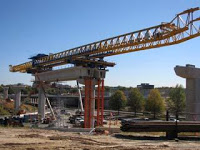Transportation bond and constitutional amendments on Fairfax County ballot
 |
| Metro construction in Tysons Corner |
In addition to electing a member of Congress Nov. 2, Fairfax County voters will have a chance to vote on a transportation bond and three constitutional amendments.
The referendum asks voters to vote Yes or No on a $120 million Fairfax County transportation bond to pay the county’s required contribution to the Washington Metropolitan Transit Authority’s Capital Improvement Program. “If the bond referendum doesn’t pass, the county will have to cut money from other programs and services in order pay its obligation to Metro,” says Del. Kaye Kory, who represents Annandale in the Virginia House of Delegates. Metro’s six-year program will fund such improvements as 400 new Metrorail cars and 500 Metrobuses; a new bus garage in Fairfax County; equipment, track, vehicle, and facility maintenance and rehabilitation; and safety measures.
All of the constitutional amendments deal with taxation and finance issues:
(1) One amendment would make it easier for homeowners 65 and older to receive property tax relief. It would revise the state Constitution to allow localities to establish their own income limits for granting property tax relief for these homeowners.
Under current law, localities are allowed to grant full or partial exemption to homeowners 65 or older or homeowners who are permanently and totally disabled. The exemption is only available to eligible homeowners who bear “an extraordinary tax burden” in relation to their income and financial worth. The constitutional amendment would remove that limitation, allowing localities to set their own requirements for income or financial worth for granting tax relief to homeowners who are 65 or older or severely disabled.
(2) Another amendment would provide a property tax exemption for disabled veterans. It would require the General Assembly to pass a law exempting veterans with a “100 percent service-connected, permanent, and total disability” from property taxes for their principal residence. The veteran’s surviving spouse could continue to claim the disability as long as he or she continues to occupy the home and does not remarry.
(3) The third constitutional amendment would increase the size of the state’s Revenue Stabilization Fund (also known as the “rainy day fund”) from 10 to 15 percent of the commonwealth’s average annual tax revenues derived from income and retail sales for the preceding three years.
This fund is used to offset shortfalls in anticipated revenues in any given year and thus provides a cushion during an economic downturn. “When the fund now reaches a 10 percent cap, additional revenues are spent elsewhere rather than a portion being saved in the rainy day fund,” Kory explains. “During the recent major recession, Virginia revenues decreased significantly, falling far short of projections. Because the size of the rainy day fund has been modest, it provided only a little help when revenues dropped.”

